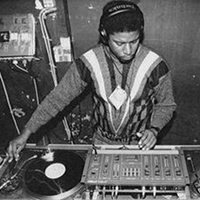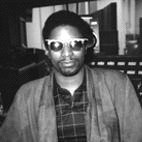 One of the original innovators in Chicago house, Marshall Jefferson had a hand in several of the music’s most influential early tracks. As a solo act, he recorded 1986’s “Move Your Body” — sub-titled and unanimously acclaimed “The House Music Anthem.” Jefferson also helped record Phuture’s “Acid Tracks,” the first and best acid-house single. Later, amidst a wave of acid-inspired records, he grew tired of the sound and moved into a more spiritual form of music later termed deep house; along with Larry Heard, he became one of its best producers.
One of the original innovators in Chicago house, Marshall Jefferson had a hand in several of the music’s most influential early tracks. As a solo act, he recorded 1986’s “Move Your Body” — sub-titled and unanimously acclaimed “The House Music Anthem.” Jefferson also helped record Phuture’s “Acid Tracks,” the first and best acid-house single. Later, amidst a wave of acid-inspired records, he grew tired of the sound and moved into a more spiritual form of music later termed deep house; along with Larry Heard, he became one of its best producers.
Jefferson was born in Chicago in 1959, the son of a police officer and a school teacher. Heavily into hard rock like Black Sabbath and Deep Purple during the 1970s, he attended university to study accounting, but left after three years to take a job in the post office.By 1983, friends began taking him to Chicago’s Music Box club; after being exposed to Ron Hardy’s influential mixing style, Jefferson soon realized that house music had a real feeling to it, unlike the commercial disco sound he was accustomed to hearing on the radio. House artists like {ln:Jesse Saunders} and Jamie Principle had begun releasing records by that time, and Jefferson felt the need to begin recording as well. He bought a synthesizer/sequencer combo and passed several of his newly recorded tapes on to Ron Hardy. The legendary DJ liked what he heard and began dropping the tracks into his set.
 During the two-year period from 1985 to 1986, Marshall Jefferson released half-a-dozen of the biggest club hits in Chicago. His first release, “Go Wild Rhythm Trax,” appeared on Virgo Records in 1985. Later that year he produced his friend Sleazy D’s “I’ve Lost Control,” and the track became a big club hit. “Move Your Body,” another recording first introduced by Hardy, was given a full release on {ln:Trax – The House that built Chicago ‘Trax Records} in 1986; the single immediately dropped a bomb on Chicago crowds, who soon began acknowledging the track as house music’s defining moment.
During the two-year period from 1985 to 1986, Marshall Jefferson released half-a-dozen of the biggest club hits in Chicago. His first release, “Go Wild Rhythm Trax,” appeared on Virgo Records in 1985. Later that year he produced his friend Sleazy D’s “I’ve Lost Control,” and the track became a big club hit. “Move Your Body,” another recording first introduced by Hardy, was given a full release on {ln:Trax – The House that built Chicago ‘Trax Records} in 1986; the single immediately dropped a bomb on Chicago crowds, who soon began acknowledging the track as house music’s defining moment.
Less than one year after “Move Your Body” however, Chicago was forced to react to another important milestone, the onset of acid-house. The trio known as Phuture ({ln:DJ Pierre}, Spanky and Herb J) had recently recorded some material using the acid squelch of {ln:Roland TB-303 ‘Rolands TB-303} synthesizer, and with Marshall Jefferson’s help, they entered the studio to record a full version. Phuture emerged from the studio with “Acid Trax,” one of the most influential songs in the history of house. Several months after its release, it had spawned literally hundreds of imitators and answer versions; soon the Chicago house scene had become swamped with tracks soaked in the squelchy reverbs of the {ln:Roland TB-303 ‘303}.
Given the lack of variety in the scene, Jefferson quickly tired of acid house. Instead of continuing with acid, he recorded an atmospheric slice of house inspired by the original vibe he had experienced at the Music Box back in the early ’80s. The track, “Open Your Eyes,” took its place alongside contemporary productions by {ln:Larry Heard}, signalled a new feeling in house music, named deep house for its level of emotion and organic beauty.
Unlike many Chicago house producers, Jefferson managed to make a good living during the late ’80s and early ’90s, when house music went global almost overnight and the bottom dropped out of Chicago’s fraternal club scene. Several Marshall Jefferson productions not recorded under his own name, such as Hercules’ “Lost in the Groove,” Jungle Wonz’s “The Jungle” and Kevin Irvine’s “Ride the Rhythm” all became sizeable club hits. Also, he masterminded the career of the preeminent house vocal group Ten City from 1988 through 1992, and began DJing around Europe after being offered several high-profile spots in 1989. Jefferson spent much of the 1990s remixing and DJing, but did record under his own name for the 1997 album Day of the Onion.
Marshall Jefferson TOP TEN according to Jahsonic:
- ‘My Love’ – Masters At Work (Freetown) “Underground network dub. As soon as everyone hears the beat – and it’s a really funky beat – they get a crook in their back from moving to it. It’s one of those records.”
- ‘True Spirit’ – Carleen Anderson (Circa) “This came out in 1994 and it’s just a beautiful song, especially the K-Klassic mix. It ‘s really melodic and the vocal is spot on.”
- ‘String Free’ – Phortune ({ln:Trax – The House that built Chicago ‘Trax}) “This is an instrumental and everybody recognises it and dances to it. It’s got lots of stops and starts and the energy rises and falls. A peak party-time record.”
- ‘There Will Come A Fay’ (Black Lozenge mix) – The Absolute (Tribal) “This is one of those huge, building tracks. It’s an 11-minute mix that rises and falls through the whole track. It’s my automatic track – I could put the record on and go to the toilet and know the place will be rocking.”
- ‘In The Dark We Live’ – Aphrohead (Bush) “I play two different mixes and both are equally effective. Dave Clarke’s 313 mix is real hard banging techno. His 312 mix is for not-so-hard parties – a real slow builder which has been imitated a lot. It’s got a strange drum beat. It’s a classic because everybody’s nicking that beat. Halfway through, it gets really technoey and acid and everybody yells.”
- ‘Satisfy My Love’ – Sabrina Johnston (Champion) “I like the House Factor mix. When it came out, everyone played the Johan S mix, but this mix is more melodic. When I play it, everyone has a really good time – the women like it and it’s a good groove.”
- ‘Harz’ – Sensorama (Ladomat) “Another one of those slow burners. Thirty seconds into the track there’s this little part that comes in – it’s a techno track but you get this little clicking part over it and everybody gets to grooving. I like building tracks like that.”
- ‘Givin’ It Up’ – Incognito (Talkin Loud) “This is a beautiful song, excellent vocals and instrumentation. Every time I put it on, everybody sings along. It’s really nice. Even if it’s the first time you hear it, you’ve got to sing along.”
- ‘Joy’ Brersoul (Touche) “This track came out in 1994 and every time I put it on – and I can play it here, in Germany, back in Chicago – they all go for it. It’s got heavy bass and, as soon as it comes, they’ve got to dance, every place I go, yet nobody knows the track – it’s an underground classic.”
- ‘Where Love Lives’ – Alison Limerick (Arista) “Overall, this gives you a whole mood. The vocals are spot on, the lyrics are really nice. Everything’s cool!”